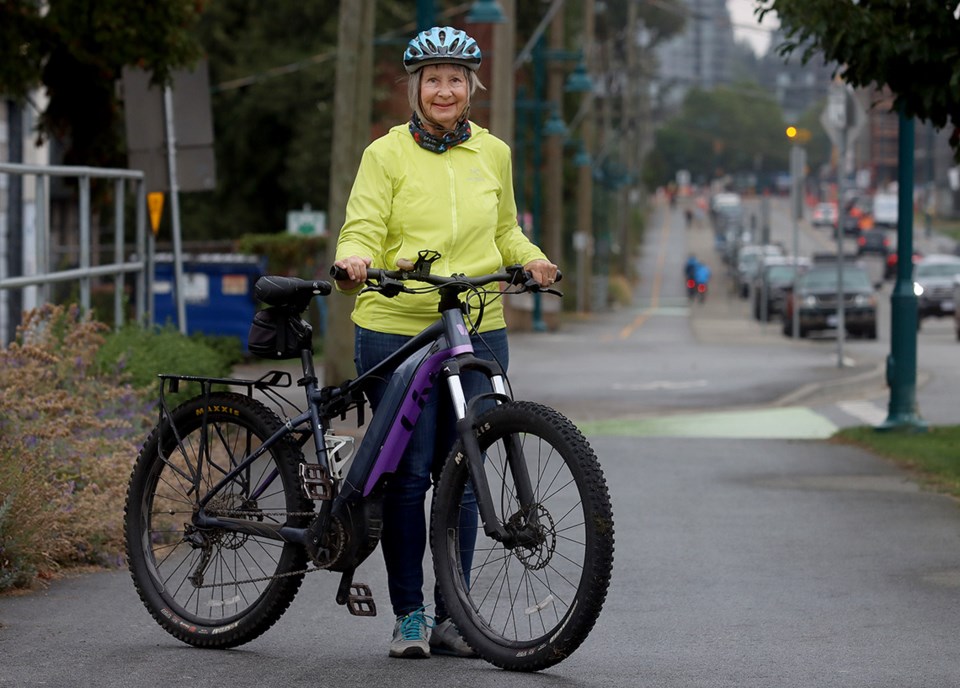A local cycling advocate says great strides are being made to encourage active transportation options in the Tri-Cities, but much work remains.
Belcarra author Colleen MacDonald, who’s published three guidebooks for cycling in different parts of British Columbia, said the recent completion of a multi-use path along St. Johns Street in Port Moody, and plans to extend the new bike lanes along Guildford Way in Coquitlam from their current terminus at Johnson Street to Pinetree Way, have improved safety along busy corridors and cyclists are responding.
“People are biking there now,” MacDonald said after a recent ride along the new St. Johns path.
According to a report on the state of cycling in Metro Vancouver released Monday, May 6, by cycling advocacy group, HUB Cycling, the kilometres of cycling routes considered comfortable for most users with physical separation from cars and trucks or calming measures like lower speed limits or diversions to limit exposure to motor vehicles increased in the Tri-Cities by 27 per cent from 2016 to 2021.
Across the region, the cycling network grew by 766 kilometres over the same five year period.
More of those routes are also being built closer to where people live.
In Coquitlam, 56 per cent of the city’s population lives within 400 metres of a cycling route considered safe for most users, while in Port Moody the percentage is 73 per cent and in Port Coquitlam it’s 84 per cent.
That’s resulted in a slight increase in the number of commuters using a bike as their primary way to get to work — a 0.2 per cent boost in Port Coquitlam, a 0.1 per cent decline in Coquitlam while Port Moody has remained steady.
MacDonald said gaps remain, though, that would improve commuting and recreational cycling opportunities even more when they’re addressed.
“Gaps stop people from going,” she said.
In 2023, Port Moody council approved the expenditure of up to $24,000 to develop a concept plan and implementation strategy for an extension of the new separated bike lane on Guildford Way to Ioco Road from the Coquitlam border.
As well, the city is looking at the possibility of new protected bike lanes on Heritage Mountain Boulevard and the southern side of Murray Street, across from a new multi-use path that was recently completed on the northern side.
In Port Coquitlam, plans for a new multi-use path along Kingsway Avenue, between the Coast Meridian Overpass and Kebet Way, recently received almost $500,000 in funding from the provincial government.
Bypass woes
But there’s still no sign of a safe cycling route along the busy Mary Hill Bypass despite a commitment from B.C.’s ministry of transportation and infrastructure to begin design work a three- to four-metre wide eastbound path as part of “economic recovery funding” in late 2020 to help communities cope with the impacts of the COVID-19 pandemic that set in March of that year.
MacDonald said getting proposed bike routes realized can be a slow, frustrating process.
“The plans are there, but implementation awaits funding,” she said, adding many of the necessary routes to create a fully connected network were identified as long as a decade ago.
“It’s just too slow a process.”
MacDonald said a particular area of concern has been the increasing need for a safe cycling route to Belcarra, especially as more people visit the area’s lakes and trails.
While a cycling route has been a part of Metro Vancouver’s transportation plan since 1997, it’s never grown beyond painted lanes along the narrow shoulders of Ioco Road, First Avenue and Bedwell Bay Road that can become crowded in the summer months with families walking into Belcarra Regional Park toting picnic and beach supplies to avoid congested parking lots and roadside parking restrictions.
“It is not safe right now,” MacDonald said.






